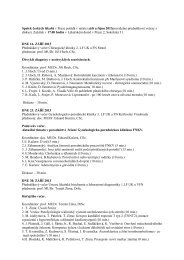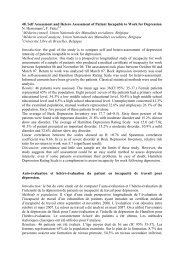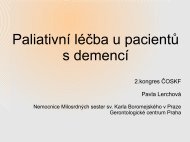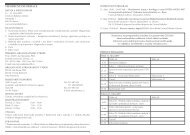ABSTRACTS â ORAL PRESENTATIONS - AMCA, spol. s r.o.
ABSTRACTS â ORAL PRESENTATIONS - AMCA, spol. s r.o.
ABSTRACTS â ORAL PRESENTATIONS - AMCA, spol. s r.o.
You also want an ePaper? Increase the reach of your titles
YUMPU automatically turns print PDFs into web optimized ePapers that Google loves.
However, a precise mode of the regulation of 5-FU-elicited autophagy and its functional<br />
role in general cytotoxic response of colon cancer cells as well as its relationship with<br />
p53 signaling still remains poorly defined.<br />
We investigated the ability of 5-FU to trigger autophagy in human colon cancer cells with<br />
different p53 status, the kinetics of the response, and the essential molecules involved.<br />
Using chemical inhibitors of autophagy (e.g. 3-methyladenine, bafilomycin A1) or specific<br />
siRNAs against crucial autophagy regulators of the Atg family, we studied the functional<br />
role of autophagy in modulation of the overall death response of colon cancer cells to<br />
5-FU. The crosstalk of 5-FU-induced autophagy and apoptosis was also examined and<br />
compared in cells with different status of p53.<br />
We showed that the ability of 5-FU to trigger autophagic response was significantly<br />
enhanced in colon cancer cells deficient for p53, which were simultaneously less<br />
sensitive to 5-FU-induced apoptosis compared to their wt counterparts. Chemical<br />
inhibitor-mediated blockage of autophagy in its early (3-MA) or later (bafilomycin<br />
A1) stages resulted in suppression or stimulation of 5-FU-induced apoptosis and/or<br />
overall death especially in p53-deficient colon cancer cells, respectively. At the same<br />
time, siRNA-mediated silencing of selected Atg family regulators (e.g. Beclin 1, Atg7)<br />
exerted weaker effects. In addition, inhibition of selected MAPKs impaired 5-FU-induced<br />
autophagy preferentially in cells lacking p53.<br />
Our results suggest that targetting autophagy could contribute to the modulation of the<br />
general cytotoxic response to 5-FU especially in colon cancer cells with non-functional<br />
p53.<br />
This work was supported by the grants from IGA of the Ministry of Health of the Czech<br />
republic No. NT11201-5, Ministry of Education, Youth and Sports of the Czech Republic,<br />
European Regional Development Fund (CZ.1.07/2.3.00/20.0180).<br />
P3. EFFECT OF HSP90 INHIBITION ON CELL CYCLE REGULATION VIA ITS CLIENT<br />
PROTEINS<br />
Ľubomír Čulka, Jaromír Mikeš, Lenka Kundeková, Peter Fedoročko<br />
P. J. Šafárik University in Košice, Faculty of Science, Institute of Biology and Ecology,<br />
Košice, Slovak Republic; lubo.culka@gmail.com<br />
Heat shock protein 90 (HSP90) is an abundant protein crucial for many cellular processes.<br />
It fulfils a protective function for the cell under stress conditions and it also plays an<br />
essential role as molecular chaperone. In addition, HSP90 exerts its function via specific<br />
subset of proteins called client proteins, as the HSP90 function is essential for their<br />
conformational maturation and stability. Regulation of client proteins by the chaperone<br />
plays a crucial role in processes such as cell cycle control, differentiation and apoptosis<br />
(Mahalingam et al., 2009)<br />
In cancer cells, HSP90 overexpression is regularly observed in many types of tumours<br />
and its higher levels are typically associated with poorer prognosis and resistance to<br />
Analytical Cytometry VII 89








